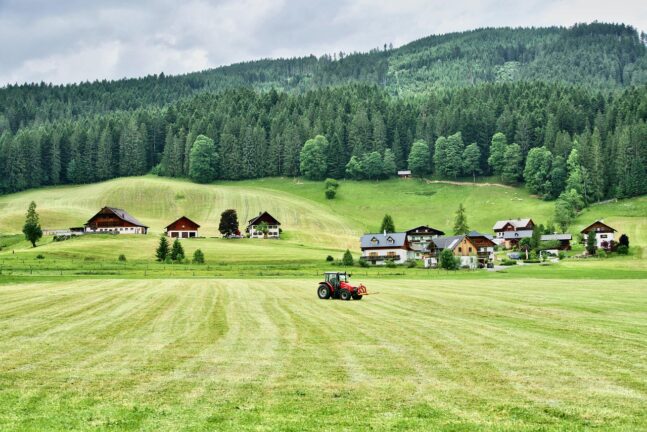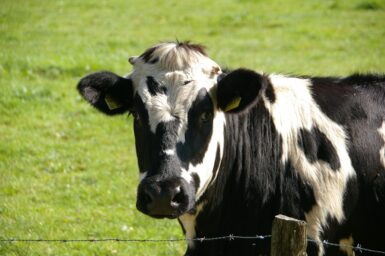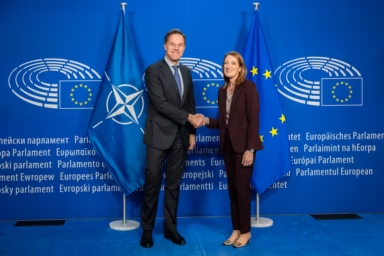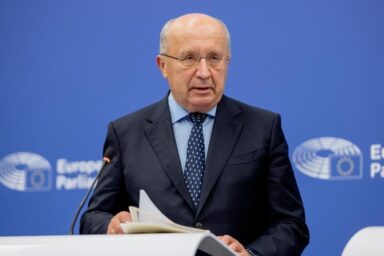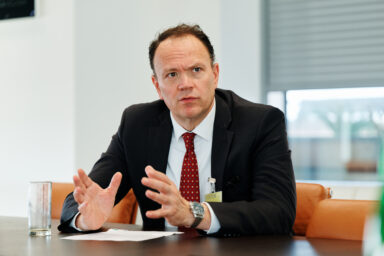The Danish Presidency of the Council of the EU has repeatedly outlined its ambition to help build a more secure, competitive, and green Europe. Central to that vision is a renewed focus on the farming and agriculture sector, at a time marked by continuing instability. The war in Ukraine, the effects of climate change, rising trade tensions, and the possibility of further tariff shocks.
Veronika Vrecionová, MEP and rapporteur on animal welfare legislation, introduced Denmark’s Minister for Food, Agriculture and Fisheries, Jacob Jensen, at Tuesday’s meeting of the European Parliament’s AGRI Committee, echoing his message that “the goal is to make life easier for farmers, fishers, and food producers.”
Easier, sure. But what about roadblocks ahead?
Minister Jensen fleshed out the message after the introduction and presented the Danish Presidency’s priorities. Afterwards he faced questions from MEPs on long-standing sticking points – including the future of the EU’s Common Agricultural Policy (CAP). It has been widely reported, ahead of an announcement on Wednesday, that the European Commission plans to merge the CAP’s two-pillar system into a single fund and introduce progressive cuts to direct payments. Payments along set thresholds could face reductions ranging from 25 to 75 percent, with the largest farms hit hardest.
“The geopolitical situation will impact the way we approach food and agriculture in the EU.” – Denmark’s Minister for Food, Agriculture and Fisheries, Jacob Jensen
The Commission aims to use these reforms to better target funding and boost green and innovation efforts. However, many farmers remain deeply concerned that the changes could significantly harm their livelihoods — particularly if larger operations face substantial payment cuts.
But first things first. Minister Jacob Jensen opened the presentation where he outlined once more what he and his team consider essential moving forward, before individual members of European Parliament were given two minutes each in the first round of questioning to weigh in.
What was underlined — and what resonated
Before turning to key priorities, the Danish agriculture minister briefly shared his own background, explaining that he comes from a family of farmers that goes back, he said, “about 10 generations” – clearly no newcomer. He still owns a farm back in Denmark, the minister added. He then reminded the committee that Denmark is holding the Council presidency for the eighth time, and that the priorities from its previous term — then focused on green and safe agriculture — remain relevant. Today, the focus is summed up by a new slogan: “A strong Europe in a changing world.”
Mr Jensen quickly got down to brass tacks, listing upcoming priorities, planned negotiations, and conferences aimed at pushing Europe closer to its goals. He stressed that Europe “must take more responsibility for its own security while continuing the green transition.” It will have to frame policy decisions through a lens shaped by global events. Chief among them? The war in Ukraine, rising economic uncertainty, and shifting global trade dynamics — the latter implicitly tied to new US tariffs, even if not named directly. Listed below are key issues that the minister discussed.
You might be interested
Simplification and de-regulation
A long-running concern for the EU has been not to increase the burden of what Mr Jensen on Tuesday called “unnecessary” administration for farmers and food producers. Whichever way the EU moves forward, simplicity has become a resonant byword and target. The Danish presidency, elsewhere, has promised to advance an agri-simplification package.
Green initiatives as well as a market-oriented Common Agricultural Policy or CAP
The minister flexed Denmark’s commitment to green innovation moving forward and stressed that the common policy after 2027 must see a market-driven approach to farming.
Generational renewal in the farming sector
Mr Jensen emphasised the need to make farming attractive to young newcomers who rank a tiny minority in the sector: only 11 percent of farmers are under the age of 40. Six percent under the age of 35. Part of expected CAP reforms the European Commission will unveil are steps to make farming more promising for the next generation. That ties into negotiating and agreeing measures that increase competitiveness, take on unfair business practices, implement diversity on a wide range of food products, and take into account scientific advances and allow for innovation and new tech such as:
NGTs & bioeconomy
Minister Jensen has promoted new genomic techniques, biotech, and bio-based solutions with reduced administrative barriers.
A strong part of the Danish focus is then the strengthening of agri-food chains, developing an EU plant-based food action plan, enhancing animal, human & plant regulations, diversifying the protein supply of feed, and finalising fisheries negotiations. The agriculture minister said it was his aim to find, for example, a balance between animal welfare while at the same time limiting additional economic burdens on operators.
Future-proof
Other steps include conferences on One Health, showing how human and animal well-being are interlinked. The minister stressed that future-proofing both the sector and in doing so, the EU, were paramount. The agriculture minister indicated that while many difficult tasks lay ahead, the Danish presidency, in his view, was up to the challenge.
“The current geopolitical situation forms the backdrop of our presidency especially the war in Ukraine. The geopolitical situation will impact the way we approach food and agriculture in the EU. During the Danish presidency in 2002, two times ago, we reached the agreement on the enlargement of the EU with 10 new member states. So, the Danish presidencies have a history of big achievements – a trend we hope to be able to continue (…) in these difficult times.”
A mix of support, scepticism, and open questions
Questions and topics raised by MEPs were understandably varied. Several voiced support for the Danish Presidency and its approach so far, but among others scepticism remained. Jessika van Leeuwen (EPP/NED) asked whether changes should be top-down or based on farmers’ output — arguing that reforms should return entrepreneurism to the farmers themselves, and that decisions like nitrate limits must be science based. “If manure can be turned into gold,” she said, “how?”
Carlo Fidanza (ECR/ITA) reflected on how the newly announced Multiannual Financial Framework (MFF) might impact the CAP and pressed for faster simplification. Anna Strolenberg (Greens-EFA/NED) noted that while farmers she spoke to were open to growing more protein crops, they also wanted new income streams — and asked the minister to draw on Denmark’s experience and best practices.
Taken together, the exchanges underscored how political appetite and practical concerns will shape the path ahead — not just from Brussels, but from the fields upward.
Looking ahead: the CAP under the MFF spotlight
Above all, many MEPs now have their sights set on the European Commission’s forthcoming CAP announcements — which will come under the spotlight in Wednesday’s MFF debate. For all the talk of simplification and future proofing, the real test lies ahead. Today’s exchange was a reminder that those choices will be both technical and deeply political — with a real impact on farming and those tilling the soil.
